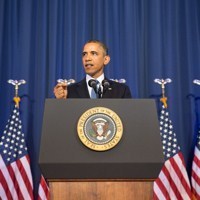Many commentators have described 2013 as a “lost year” for the Obama administration. The enthusiasm generated by the second inaugural quickly dissipated in continued stalemates with Congress, culminating in the government shutdown in October. No major pieces of legislation were passed, nor did the United States spearhead new international initiatives. Some of this can be attributed to the famed “second-term curse.” As I noted in these pages after the president’s re-election, “Every second-term president over the past 30 years—Ronald Reagan, Bill Clinton and George W. Bush—overestimated the amount of political capital their re-election generated, and each was also distracted by scandals that further limited their freedom of action.” The past year, the Washington Post’s Chris Cillizza summed up, “opened with great promise and closed with equally great disappointment.”
In March 2012, President Barack Obama was caught on an open microphone promising then-Russian President Dmitry Medvedev “more flexibility” after the presidential election. Indeed, during the 2012 campaign, U.S. foreign policy went into its traditional holding pattern. The expectation was that after the November elections, big-picture policymaking would resume, and that Washington would be prepared to make hard decisions. For the most part, however, progress was stymied by the domestic political deadlock. Obama’s position on the global stage was undercut by his abrupt volte-face on Syria and the cancelation of his trip to Asia on account of the government shutdown, in essence ceding primacy of place to Russian President Vladimir Putin and Chinese President Xi Jinping. A particularly troubling sign has been Congress’ growing willingness to put impediments on the president’s freedom of action, ranging from a clear signal that the administration would not get a blank check to commit U.S. military forces to any mission in Syria to consideration of additional sanctions against Iran at a time when talks are underway to try to resolve the nuclear issue. If Obama thought he would have more flexibility after the elections, he was mistaken.
Spring 2014, then, could be a time of repair and renewal for U.S. foreign policy. Obama will undertake his long-delayed major trip to Asia—now expected to take place in April—while his secretary of state continues with diplomatic efforts to make breakthroughs in the Middle East. If the U.S. can show progress toward reaching a definitive settlement of the Iranian nuclear issue as well as finalizing the parameters of the two massive trade agreements under discussion—the Trans-Pacific Partnership and the envisioned U.S.-European Union free trade zone—it will go a long way in revising the narrative of U.S. decline.

